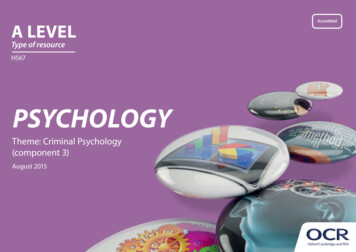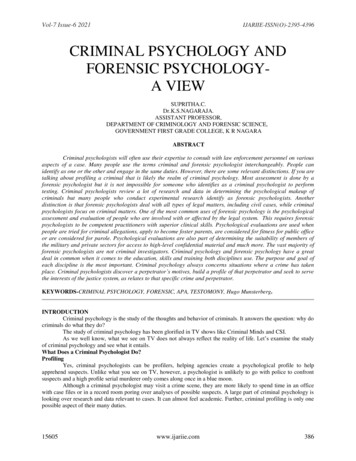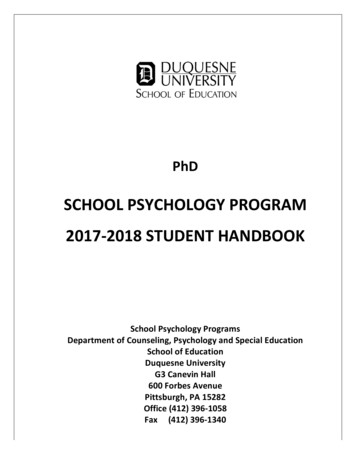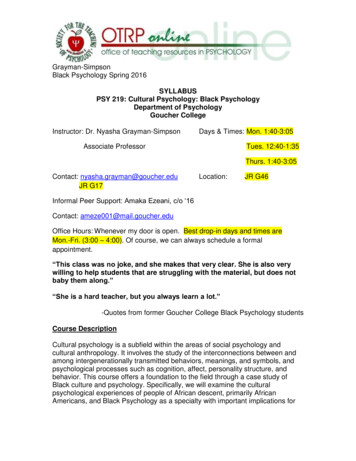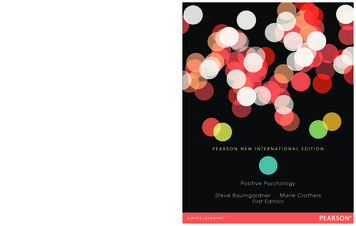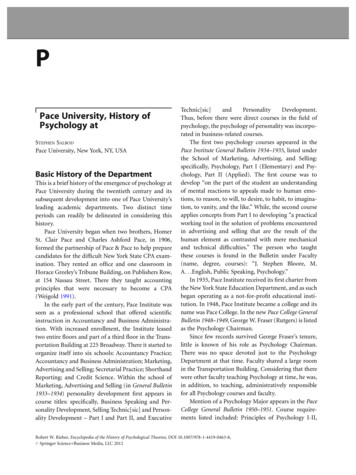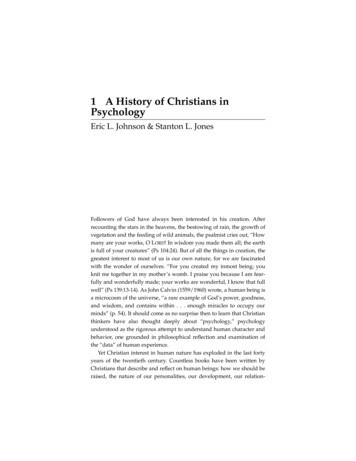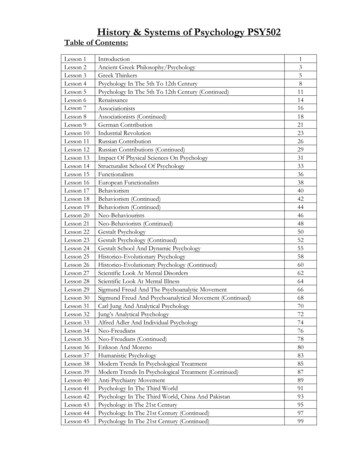
Transcription
History & Systems of Psychology PSY502Table of Contents:Lesson 1Lesson 2Lesson 3Lesson 4Lesson 5Lesson 6Lesson 7Lesson 8Lesson 9Lesson 10Lesson 11Lesson 12Lesson 13Lesson 14Lesson 15Lesson 16Lesson 17Lesson 18Lesson 19Lesson 20Lesson 21Lesson 22Lesson 23Lesson 24Lesson 25Lesson 26Lesson 27Lesson 28Lesson 29Lesson 30Lesson 31Lesson 32Lesson 33Lesson 34Lesson 35Lesson 36Lesson 37Lesson 38Lesson 39Lesson 40Lesson 41Lesson 42Lesson 43Lesson 44Lesson 45IntroductionAncient Greek Philosophy/PsychologyGreek ThinkersPsychology In The 5th To 12th CenturyPsychology In The 5th To 12th Century ts (Continued)German ContributionIndustrial RevolutionRussian ContributionRussian Contributions (Continued)Impact Of Physical Sciences On PsychologyStructuralist School Of PsychologyFunctionalismEuropean FunctionalistsBehaviorismBehaviorism (Continued)Behaviorism (Continued)Neo-BehaviouristsNeo-Behaviorists (Continued)Gestalt PsychologyGestalt Psychology (Continued)Gestalt School And Dynamic PsychologyHistorico-Evolutionary PsychologyHistorico-Evolutionary Psychology (Continued)Scientific Look At Mental DisordersScientific Look At Mental IllnessSigmund Freud And The Psychoanalytic MovementSigmund Freud And Psychoanalytical Movement (Continued)Carl Jung And Analytical PsychologyJung‘s Analytical PsychologyAlfred Adler And Individual PsychologyNeo-FreudiansNeo-Freudians (Continued)Erikson And MorenoHumanistic PsychologyModern Trends In Psychological TreatmentModern Trends In Psychological Treatment (Continued)Anti-Psychiatry MovementPsychology In The Third WorldPsychology In The Third World, China And PakistanPsychology in The 21st CenturyPsychology In The 21st Century (Continued)Psychology In The 21st Century 05255586062646668707274767880838587899193959799
History and Systems of Psychology (PSY502)VULesson 01INTRODUCTIONCourse ObjectivesThe objectives of this course are to introduce the students to the developmental history of thesubject of psychology, to prepare students to appreciate and use more advanced materials of psychologyand to provide the basic and the most modern knowledge related to psychology.MethodologyMain features of a given topic shall be discussed supported by reference materials and examplesfrom everyday life. You might be quizzed verbally by the teacher asking a question, letting you write theanswer and then giving you the correct answer. For example, ―Freud established the Behaviorist School?‖Right or wrong? The correct answer is of course ―wrong.‖ Watson‘s name is associated with BehavioristSchool. At the end of two/three lectures a homework assignment would be given. Homework assignmentwould be in the form of a short essay-type exam. It might also consist of multiple choice questions (MCQs).There would be a mid-term exam after the completion of 21, one hour lectures. There would be a finalexam after the completion of 45 lectures.GradingMidterm exam will carry 35% weightage of marks for the total course. Final exam will be acomprehensive exam and will carry 50% weightage of the total course. A total of eight assignments shall begiven carrying 15% weightage of the total marks in the course.TextsTwo main text books will be used for the course. The first one will be: ―A History of Modern Psychology‖ by Duane Schultz & Sydney Schultz and the Urdu text book used will be ―Nafsiyat ka Irtika,‖ by Rafiq Jaffer and Humair Hashmi.Both books are easily available in the market. Handouts for the entire course, prepared by the instructor willalso be available for your benefit.Course Overview up to MidtermA review of the ancient philosophy / psychology in the Indo-Pak Sub-continent, we will then havea look at the ancient Greek philosophy/psychology and go on to read about philosophy/psychology in the5th to 12th century AD. We will then consider the impact of renaissance on psychology; it will thoroughlyreviewed; we then look at the British Associationism and go on to review the French and Germancontributions to psychology up to the 18th and 19th Century. A review of Reflexive Psychology will followand then we will see the impact of physical sciences on psychology. We then look at the Structuralist Schoolof psychology, followed by a discussion on the Functionalist School of psychology, we will then reviewpsychology in the beginning of 20th century with the American contribution that is known as―Behaviorism,‖ and review ―Behaviorism‖ and ―Neo-Behaviorism:‖ Midterm exam will be held for coursecovered from ―Ancient philosophy/psychology to Neo-Behaviorism‖@Copyright Virtual University of Pakistan1
History and Systems of Psychology (PSY502)VUCourse Overview up to Final ExamAfter the mid term exam more recent European contributions to psychology shall be discussedthose will include: The Gestalt School of psychology, the English Dynamic psychology, the HistoricoEvolutionary Psychology. We will then take a scientific outlook at mental illness. And then study thePsychoanalytical School in the beginning of 20th century, followed by Jung‘s Analytical Psychology, andAdler‘s Individual Psychology, followed by Psychodynamic contributors. It will then lead to a review ofHumanistic Psychology. We will then see the modern trends in psychological treatment of mental disorders,including Anti-psychiatry Movement. We shall then see the development of psychology in parts of Africaand Asia in 20th Century and finally a look at psychology in the 21st century.Ancient Philosophy/Psychology in the Sub-ContinentThe first and the foremost problem in any discipline is that of the scope and the definition. Such isthe case with psychology. It is only when we define psychology that we can move forward to view―psychological‖ thoughts and ideas of man from ancient times up to today.Psychology for that and the present purpose can be defined as the ―study of mind and body.‖ Theancient man regarded ―soul‖ as something that was invisible and resided inside a person. He had his ownexplanations for the behavior of the soul and the body. For example the soul escaped the body when aperson was asleep. The escaped soul then performed certain actions on behalf of the person that was visiblein the form of dream work. Further, dream work, fainting spell, epileptic fits, mental and physicaldiscrepancies were also regarded as expressions of the soul.The ancient man also believed in what is termed ―animism.‖ Animism is the process of seeinghuman qualities in inanimate objects such as moon, stars, stones etc. He humanized those objects in orderto make them easy to understand. The ancient man had a strong belief in magic and tried to learn and adoptmagical tricks which were his way of exercising control over things around him.Ancient Indo-Pak history of psychology was no exception where also magic was an importantelement. Magic as mentioned earlier, was used to exercise control over others and nature. It may be used fornegative purposes or positive purposes.The ancient man also indulged in different exercises and activities to gain control over his body.Yoga was one of such exercises involving breath control and different body postures. One of the yoga‘sbeliefs was that body and soul are related and connected and this connection influences body and soul both.The ancient philosophy or psychology of the sub-continent advanced the belief that consciousnessis related to the brain. The ancient Europeans, the Greeks for instance, thought that consciousness was afunction of the heart of a man.About a thousand years B.C. the sub-continentals differentiated between mental and physical labor.Mental labor was the process of thinking and using the mind to solve problems, while physical labor was toperform certain tasks physically. Mental labor was considered superior by the ancient man while physicallabor was considered inferior. They also believed that our mental faculties are inherited.According to the sub-continentals Atma or the soul of a person was the pure self. Further, theworld around us was an illusion or a deception played on us by our senses. Some others believed thatconsciousness and mind were the products of material development. These two beliefs are called Idealismand Materialism today. The later ancient Greek philosophy has a number of similarities to the subcontinental views.@Copyright Virtual University of Pakistan2
History and Systems of Psychology (PSY502)VULesson 02ANCIENT GREEK PHILOSOPHY/PSYCHOLOGYThe ancient Greek philosophers/psychologists regarded three elements to be the basic ingredientsof all matter including humans. These three elements were: Water Air And fireThe ancient Greek philosophers also put forward the view that contradiction is a permanentelement in the world and because of it the world is influx all the time. This means that every time aphenomenon arises there is a counter explanation to the phenomenon. Thus a contradiction in explanationarises which leads to further investigation and further phenomenon and counter phenomenon. When thisprocess continues over a long period of time, we find the world to be in a constant influx.One of the greatest developments of the Ancient Greek philosophers was that they put forward theview that everything consists of small indivisible particles and these particles act upon on the soul to createsensations. This was later found to be true with the discovery of atoms.SocratesSocrates is considered to be one of the most important ancient philosopher/psychologist. He laidthe foundation of ideas for many philosophers/psychologists to follow. Socrates was born in 469BC and hedied in 399BC. In his opinion knowledge and truth reside in the mind and one has to look for and find itthere. It means that in order to gain knowledge and understand various phenomenon one has to lookinwards instead of looking at the outward things and trying to find an explanation in them.He further said that knowledge and awareness create virtue, so in order to be virtuous one has tolook into the self. In other words, Socrates stressed on the study of soul i.e. looking inwards, and he rejectedexternal observation.Another of the Socratic contributions is that he defined the concept of happiness. To Socrates,stealing is not happiness but the satisfaction gained through acquiring by honest means is happiness.He regarded the soul, called psyche in Greek, as superior to body and said that the psyche or thesoul helps us to distinguish between good and bad. Socrates asserted that all things have a definite purposeand nothing occurs without that purpose.Another of the great contributions of Socrates is his method of teaching. It is called the Socraticmethod of teaching. It is also the modern method of teaching and it consists of a dialogue, rather thanmonologue and focuses on the logical correctness of the argument. The teacher and the student interactwith each other and have an intelligent dialogue that helps them to understand and comprehend better. Themonologue is discouraged because it involves only one way flow of information, further it does not clear upany misunderstanding that may arise in the mind of the students, who are not able to express themselves.The Socratic method of teaching is in practice these days.PlatoPlato was a pupil of Socrates and another important Greek philosopher/psychologist. He was bornin 427BC and he died in 347BC.@Copyright Virtual University of Pakistan3
History and Systems of Psychology (PSY502)VUFollowing the Socratic tradition, Plato was also of the view that knowledge is innate and inside themind. In order to extract knowledge one needs to look into the mind rather than looking at external objects.This method was later called the introspective method in which outwardly observation is discouraged andlooking into the mind or the soul is encouraged. This method was later adopted by manyphilosophers/psychologists who agreed with Platonian and Socratic methodology.Plato is also considered an idealist philosopher who believed in the supremacy of ideas. He did notbelieve in acquiring knowledge by empiricism and observing facts. He thought that ideas are the only sourceand the true source of knowledge. As an individual looks into his ideas he can extract the best possiblesolutions and explanations to the problems that are encountered by him or her.Another of Plato‘s contributions is that he described the parts of personality as Intellect Will And appetite.The intellect is the ability to understand, while the will is the drive to do something. Appetite on the otherhand is the part of the personality that deals with bodily needs. According to Plato, ideas are eternal, theyare not born, and neither do they die while worldly objects change and die. Therefore, true knowledge, asmentioned earlier, can be gained from ideas rather than observation. Plato also regarded the soul or psycheto be permanent and the body as something that could change. This further suggested that knowledge couldbe acquired through the soul or the psyche but not by the use of bodily sensory organs. To Plato sensoryorgans were a hindrance to the acquisition of knowledge.Plato suggested that the soul has three parts:oReason, located in the headoPassion, located in the chestoAppetite, located in the stomachThe function of the reason is to control and direct the passion and appetite. Passion is the desire to performa certain action. Appetite part of the soul refers to the natural needs of the body, such as hunger, thirst etc.According to Plato, some passions and appetites are satisfied in dreams. This concept given by Plato issimilar to what was later given by Freud as id, ego and super ego. Plato was the one who established thefirst ever university by the name of Academy.@Copyright Virtual University of Pakistan4
History and Systems of Psychology (PSY502)VULesson 03GREEK THINKERSAristotleAristotle was one of the greatest philosopher/thinker ever in the history of mankind. This Greekphilosopher/psychologist, Aristotle was born in 384BC and he died in 322BC. Aristotle was a student ofPlato and his ideas not only show the influence of Plato‘s thinking but also sometimes Aristotle haspresented completely opposing views to his teacher.Aristotle wrote a book by the name of De Anima which means ―the Soul.‖ Since soul wasconsidered to be the primary topic of interest for philosophers/psychologists at that time, Aristotle isconsidered to the first psychologists ever. Aristotle rejected the idea of dualism of soul and the body andput forward the view that these two are not separate but one entity.Aristotle was of the view that ideas in the human beings tend to become associated with each otherand there are three reasons for the association of ideas which he gave:SimilaritySimilarity means that the mind tends to see certain similar patterns between two things and relates themtogether. This is the simplest explanation of the association of ideas where, for example, two events which aperson witnesses have certain common elements. These may then be associated with each other due to thesimilarities present in them.ContiguityContiguity refers to two things or events happening close to each other so that the person is able to relatethem to each other. For example, if two events occur consecutively, one after the other, they tend to getassociated with each other. This is an example of contiguity of ideas, where one even may remind of theother event which is contiguous to it.ContrastContrast means that two events or ideas are completely opposing to each other, which results in theformation of a link between the two. Humans tend to associate the ideas together. These may be twoconflicting statements by someone. One statement would remind a person about the other conflictingstatement immediately.Therefore, in this way ideas tend to become associated with each other.According to Aristotle, man is a biological being whose functions include: Eating Perceiving Having children Thinking And doing things.All of these are characteristics of living organisms. It eats to fulfill the requirements for the nourishment ofits body and its growth. It perceives and responds to stimuli according to its perception. It has the ability toprocreate and expand its species. Higher form of living beings such as humans has the ability to use theirmind to think and analyze objects and happenings around them. Further, according to Aristotle, one of thefunctions of human beings is doing things, which means that humans are involved in various activitieswhich they perform throughout their lives which may be anything such as reading this text.@Copyright Virtual University of Pakistan5
History and Systems of Psychology (PSY502)VUAccording to Aristotle‘s teacher Plato, ideas are eternal. They are neither born nor do they die while worldlyobjects change. Therefore, according to him the true source of knowledge is ideas themselves. Plato furtherasserted the soul or psyche to be permanent and the body as something that could change. Therefore,according to Plato, knowledge could be acquired through the soul or the psyche and sensory organs were ahindrance to the acquisition of knowledge. This was an introspective and subjective method of learning,which means to look into the mind to find solutions to problems. Aristotle on the other hand rejected histeacher‘s views on introspection and said that true knowledge can only be gained through observation andempiricism. As human beings observe the phenomenon going on around them and the world around them,they tend to make judgments and decisions that are based on their objective perception rather than theirsubjective biases. Therefore, instead of looking to the mind, one needs to look at the world around in orderto gain knowledge. This implies that in Aristotle‘s views, sensory organs are not a hindrance to learning, butthey are the source of gaining knowledge.Aristotle also described two types of human motives which are Primary motivesPrimary motives are basic motives which are the desires of all human beings and are mostly bodilydesires such as such as hunger, sex, thirst, anger and need for rest. Such motives are not just possessedby human beings but may also be possessed by other living beings. An important aspect of suchmotives is that they are not learnt by the organisms; rather they are a part of the genetic makeup of allorganisms. Humans are born with these motives, in other words these motives are inherited and theybecome the cause of propelling a person to perform a certain act or to do something. For example,hunger may cause a poor man to beg for food. Therefore, his basic bodily desire has caused him toperform a certain action. Such desires or motives are called primary motives by Aristotle. Secondary MotivesSecondary motives are those motives which are learnt by organisms and these become habits of theindividuals. For example, it is the habit of certain people to socialize with others. Some people have thedesire to dominate their fellows. These motives become the habits of individuals and they tend tofollow them quite often. Therefore, they are called secondary motives by Aristotle.Another great contribution of the great philosopher Aristotle was that he recognized that there areindividual differences in various respects in people. These differences may be in the intelligence level, incertain abilities, sports, math etc. For example, one individual may be a very good sportsman but not a verygood musician, while another may be a very good musician but not a sports man. Therefore, differencesexist in all individuals as far as their personal characteristics are concerned. This is the reason for someindividuals to excel in certain fields.Aristotle further suggested that these individual differences are created during the life span of a person, butthey are inherited by the person. He is born with these differences which may although be discovered inlater in life.Apart from these individual differences that are inherited and are a part of the genetic makeup of allindividuals, Aristotle was of the view that the early childhood experiences and training of an individual havea profound impact on him or her. Childhood is the time when the mind is open to all influences from theenvironment. A child would learn to behave in a certain manner as he would see the individuals around himdoing. Further, training of a child is also an important factor that would influence his behavior throughouthis life. The way he has been trained and educated during the early years of his life, that is childhood, he isexpected to show some influence of it in every part of his or her life. A child of Pakistani family who hasbeen educated and grown up in the United States cannot be expected to behave in a similar manner to theone who has been grown up in Pakistan. That is because his experiences in his environment and trainingthat he gets is absolutely different from the child grown in Pakistan. This influence is expected to lastthrough out his or her life.@Copyright Virtual University of Pakistan6
History and Systems of Psychology (PSY502)VUAristotle also gave the concept of Catharsis. Catharsis is the sudden release of emotions by a person whenhe sees, hears or feels something. For example a person may start crying when he hears about a tragedy thatsomeone else has encountered, or a people often have soaked eyes when they watch a tragic scene in amovie. These are the examples of catharsis where emotions are suddenly released by the individual. Theremay be also the emotions such as happiness or joy which someone feels when a villain is being beaten up bythe hero of the movie. The list of contributions of Aristotle is a long one. This is why he is considered to beone of the greatest thinkers of mankind. His ideas have left a profound and a long lasting impact on man‘sthinking.@Copyright Virtual University of Pakistan7
History and Systems of Psychology (PSY502)VULesson 04PSYCHOLOGY IN THE 5TH TO 12TH CENTURYThe period from 5th to 11th century A.D. is considered the dark ages of Europe. It was the periodin between the great Greeks and the progressive industrialized Europe. The dark ages were the period whenthere was a general discouragement of research and investigation. Problems were not solved in the light ofresearch and observation but by invoking religious edicts. Intellectuals adopted Plato‘s idealism whileAristotle‘s empiricism and observation were rejected.It was believed that God was the most exalted being, followed by wisdom, followed by soul andthen followed by matter. So matter of the body was the lowest from of existence and wisdom the highestafter God. It was also thought that wisdom could be gained by looking inwards and by reflection which wasthe Socratic and Platonian point of view. The dark ages also had an impact on psychology. But during thesame period emerged some prominent philosophers/psychologists whose contributions to psychology arenoteworthy.Saint AugustineAn important contribution to the subject of psychology of those times is that of Saint Augustine.He was born in 354AD and died in 430AD.Saint Augustine proclaimed that evil or sin is a product of free will. This means that it is the freewill of an individual that makes him indulge into sins, evils and crimes. There ought to be checks on everyperson‘s free will which is certainly what the order of the society is about. A society imposes certain limitsto the exercise of free will of a person which therefore results in regulation of the society. If every person isallowed to practice his will freely there would be no society and only chaos. Saint Augustine furtherproclaims that pride is a cardinal sin which is also the cause of many other evil acts that a person indulgesin. It makes him unaware of the consequences of his actions which may be harmful for others. Therefore,Saint Augustine points out certain psychological elements in human beings that influence their actions andthe society as a whole.Saint Augustine agreed with the prevailing ideas that the universe contains two basic principles: The principle of light and goodness And the principle of darkness and evilThis means that there are two paths in the universe and it is up to the individual to decide upon which pathto take. According to Augustine we can discover these by looking inwards into our minds or what is calledintrospection. This idea is similar to that of the Socratic Platonian ideas. According to them, looking intothe self brings awareness and light of knowledge and that is the only way of gaining knowledge. Plato evenconsidered the sense organs as a hindrance to the acquisition of knowledge. Plato and Socrates had also saidthat knowledge is virtue. St. Augustine added to their views by saying that a person can look into self in thesame way as one looks at external objects. How to introspect or to look into the self was on the one of thebiggest difficulties that were encountered by the philosophers and thinkers of that time. St. Augustineprovided a simple solution to it by saying that we can look at external objects through our sense organs, butwe can look in by reflection. Reflection here refers to looking at and understanding ideas and thoughts andfinding solutions to problems through the association of ideas within the mind. This was his solution to theproblem of how to look inwards. Because of this stress by St. Augustine on looking inwards and his methodof looking inwards, he is usually regarded as the first introspective psychologist. Introspective psychologiststherefore are those psychologists who encourage looking into the mind to find solutions to the problemsrather that observing outwardly things and trying to find solutions to problems by using the sensory organs,as propounded by Aristotle. Plato and Socrates on the other hand were in favor of introspection.@Copyright Virtual University of Pakistan8
History and Systems of Psychology (PSY502)VUAnother great contribution of St. Augustine is his explanation of consciousness which in his view isconstantly flowing. This also is related to his idea of introspection. He said tat consciousness flowsconstantly in the form of a stream and it is up to us how we look into the stream to get ideas and generatesolutions to our problems. This stream of ideas is the basis of all knowledge. His ideas of introspection werelater used by psychologists such as Wundt and Titchner.AvicennaAvicenna holds very prominent position in the history of philosophy/psychology. He was born in980AD and he died in 1037AD. Avicenna studied the Holy Qurran, physics, theology and medicine andadopted a most rigorous method of the distinction between concepts.Like the ancient thinkers, Avicenna was also of the view that human soul was non-material andimmortal. It does not exist in any material form, but nevertheless exists in the body. Therefore he rejectedthe concept of a unity between soul and the body as given by Aristotle. To him the soul was a separateentity and the body was a separate one. Avicenna was of the view that soul has its identity and its ownoperative laws just as there are the operative laws of the body. In order to study the soul and discoversolutions to problems regarding the soul and the body, we need to study and become aware of the operativelaws of the soul. This in turn would then help in the process of gaining knowledge as well. Once theoperative laws of the soul are determined, it would be easier to know how the soul thinks and what governsits actions and influences it to behave in a certain manner.Avicenna was of the view that the mind has a tremendous effect upon the body, such that it canmake it sick or make it healthy. Here the mind and the soul are considered to be the same thing as theancient thinkers or philosophers thought. Avicenna thought that the soul has an influence to the extent thatif a person thinks that he is not well the body responds in a similar fashion and he actually becomes ill.Therefore, soul is stronger than the body and it can dictate the body to behave in a certain manner. Hefurther added that strong soul or mind can not only affect a person‘s own body but it can affect others aswell. This is the case in hypnosis where a person tends to bring the other person under the influence of hismind and makes him do what he wants him to.Elaborating his views on the strength of the mind or the soul, Avicenna said that the soul had thepower to the extent that it ordered the body to move and the body obeyed. In other words the soul wasresponsible for all the actions of the body.Following the Aristotelian tradition Avicenna recognized four stages of motion. Motion here refersto the process of performing a certain act. Based on these stages of motions, Avicenna tried to explain thehuman actions. The four stages of motion are:ImaginationImagination is the process of thinking about something in which in turn leads to a desire of possessing thatthing.DesiresIt is the second stage of motion according to Avicenna which represents a person‘s willingness to achievesomething or to act in a certain manner. The person desires to posses something or to do something.ImpulsionThe desires of the person cause him or push him to do something. This is the third stage of motion as givenby Avicenna. The person is motivated by the desire to make a certain move which would satisfy the desire.Movement@Copyright Virtual University of Pakistan9
History and Systems of Psychology (PSY502)VUThe last stage of motion according to Avicenna is the movement where a person actually makes the moveto satisfy the desire that was cause by his imagination and which has forced him to perform a certain actionor make a movement to satisfy it.In other words, imagination creates desires, which in turn propels the person and then the person acts.Another of Avicenna‘s contributions is that he distinguished betwe
Plato suggested that the soul has three parts: o Reason, located in the head o Passion, located in the chest o Appetite, located in the stomach The function of the reason is to control and direct the passion and appetite. Passion is the desire to perform a certain action.




